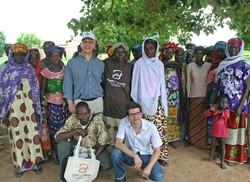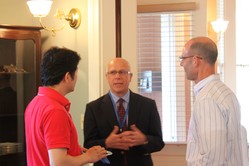His upbringing in Webster Groves, Mo., hinted that Jim McDonald might one day serve as a seminary president.
His subsequent career ― from small urban church pastor to active involvement in the sanctuary movement with Central American political refugees to public policy work on behalf of the world’s poor at Bread for the World ― almost made it inevitable that San Francisco Theological Seminary (SFTS), with its longstanding reputation for social and political activism, would be the seminary.
Webster Groves is the home of Eden Theological Seminary, one of seven seminaries of the United Church of Christ, “so I actually experienced the way seminaries can serve local churches,” says the lifelong Presbyterian and since July the president of SFTS. “I grew up appreciating that connection and how important churches and seminaries are to each other.”
McDonald says his social conscience was first pricked at age 14 while he was in the Webster Groves Presbyterian Church-sponsored Boy Scout troop. “We were asked to read Alan Paton’s Cry the Beloved Country for our ‘God and Country Award’ and it opened me up to issues outside my own community and country,” McDonald says.
About that same time, his mother ― “a woman of deep faith” who was rendered paraplegic by an illness when McDonald was a child ― persuaded a local ministers’ group to back a coffee house ministry in St. Louis’s Gaslight Square. “This was the mid-60s and she named the coffee house ‘The Exit’ as a rejoinder to Sartre’s existential novel No Exit,” McDonald says. “She was determined to show young people that life has meaning and Christianity provides it. The relationships forged there stayed strong.”
More importantly, McDonald says, “The coffee house was a powerful example of the church moving into the world rather than simply inviting people into the church. Since those days I’ve lived my life trying as the church to engage with the world.”
McDonald enrolled at Princeton University, thinking he’d become an economist or a lawyer, but midway through the 1968-1969 school year he decided to take a year to do volunteer work for VISTA. Wanting to do something during the month off before starting with VISTA, he ― at his mother’s urging ― called on the late Rev. Carl Dudley at Berea Presbyterian Church in inner-city St. Louis.
“Berea, at that time, was the heart of that community, which was basically a mixed-housing development,” he says. Dudley immediately put him to work helping run the church’s day camp. “It was powerful,” McDonald says, “and sent me on the road to ministry in congregations. From that point on Carl Dudley was my mentor, formative in how I think about ministry.”
Berea and then VISTA fueled McDonald’s interest in the public policy aspects of the church’s ministry and when he returned to Princeton, he completed his undergraduate study at the school’s Woodrow Wilson School of public policy. From there he went to Union Theological Seminary in New York “because of its reputation for raising up religious leaders in a variety of contexts.” He later completed his Ph.D. in international relations from American University in 1997.
At Union, McDonald met his wife, Dean, who was also from Webster Groves (they didn’t know each other “back home”) and was studying at Princeton Theological Seminary. They married after their first year and she joined him at Union. Always looking for new church-world intersections, the McDonalds took one year off from Union to travel to California, where Jim worked with the National Farmworkers Ministry.
McDonald spent 15 years in pastoral ministry ― five years at First Presbyterian Church of Bloomington, Ind., and 10 years at Tabernacle Presbyterian Church in Philadelphia.
In March 1980, around the time McDonald arrived at Tabernacle Church, Archbishop Oscar Romero was assassinated in El Salvador. “It was my first involvement in Central America,” he says of the discernment process the congregation launched in response to the killing before declaring Tabernacle a sanctuary church in January 1984. “It set me off on another new path to discern ministry and the place of the church in the world.”
McDonald traveled twice to Central America, first in 1986 with former SFTS Dean Ron White and again in 1988 on sabbatical, when he took his entire family to Guatemala.
His Central America involvement reignited McDonald’s interest in public policy. After completing his doctorate, “on a whim and with some reluctance” he accepted a position with Bread for the World (BFW). “‘Bread’ didn’t pay very well, and I had a growing family and, frankly, I really wondered how a small non-profit could be effective in big-money Washington, D.C.,” he admits.

Jim McDonald, center, on a recent trip to Africa with Bread for the World. —Courtesy of Bread for the World
McDonald says he “learned quickly that BFW was effective, making a huge difference for the poor and hungry.”
In fact, BFW was about to be dramatically world-changing. At the turn of the millennium, it launched the “Jubilee 2000” debt relief campaign. “It really captured the world,” he says, “actually changing policy in the U.S. and therefore at the World Bank and International Monetary Fund. For the first time, U.S. policy promoted debt reduction for poverty relief in developing countries rather than for debt reduction.
“It was an extraordinary example of God at work in the world,” McDonald says. “Something really profound happened there that changed the U.S. government.”
Despite the success of Jubilee 2000 and other efforts, McDonald says, “I kept thinking back to my time in Webster Groves and how important seminaries had always been in my faith journey.” His friends “were incredulous when I talked about the opportunity at SFTS,” he recalls. “But I’d been reading about how the economy has affected both seminaries and churches … and I felt a strong sense of call.”
McDonald is undaunted by the challenges he ― and SFTS ― face. “These are challenging times but challenges we all need to work on,” he says. “I see the seminary as a crossroads where people can meet and engage around the gospel, the call of God and what they should be as religious leaders to align ministry in all its forms with God’s purposes.”
He says he’s “been blown away by how deeply many pastors and other Presbyterians care about SFTS and what they want the seminary to do ― to be a strong resource and engage deeply with congregations.”
Those expectations can be daunting, as well, “but these are fervent hopes and I believe the seminary can be more creative,” McDonald insists. “It’s a matter of dialogue, not just meeting needs,” he adds. “We have to look for a way together to discern God’s will and purposes, to be leaven for the church and help the church be prayerfully engaged in ministry.”
That effort must include the entire SFTS and PC(USA) family, he says, including gay, lesbian, bisexual and transgender Presbyterians. He fully supports the seminary’s “inclusiveness statement,” adopted last spring. “I applaud it and celebrate it,” he says. “I know parts of the PC(USA) find it anathema, but it went through a deeply reflective process and I find it a wonderful expression of the gospel.”
On February 11, McDonald will be formally installed as SFTS’s 11th president. “First of all, I hope the occasion will be festive and fun,” McDonald says. “This is not a coronation or an extravaganza, but a time when I hope people will come and feel renewed, refreshed, engaged and looking forward in theological education. I feel a great sense of humility ― whatever comes out of my tenure will be what the Holy Spirit teases out of me.”
And, as a jazz-lover, McDonald promises a free pre-inaugural concert on February 10.

